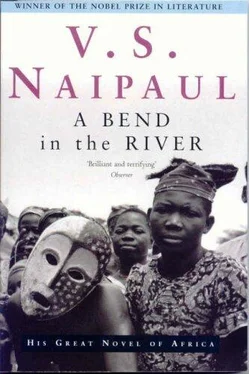V. Naipaul - A bend in the river
Здесь есть возможность читать онлайн «V. Naipaul - A bend in the river» весь текст электронной книги совершенно бесплатно (целиком полную версию без сокращений). В некоторых случаях можно слушать аудио, скачать через торрент в формате fb2 и присутствует краткое содержание. Год выпуска: 1989, ISBN: 1989, Издательство: Vintage, Жанр: Современная проза, на английском языке. Описание произведения, (предисловие) а так же отзывы посетителей доступны на портале библиотеки ЛибКат.
- Название:A bend in the river
- Автор:
- Издательство:Vintage
- Жанр:
- Год:1989
- ISBN:978-0679722021
- Рейтинг книги:5 / 5. Голосов: 1
-
Избранное:Добавить в избранное
- Отзывы:
-
Ваша оценка:
- 100
- 1
- 2
- 3
- 4
- 5
A bend in the river: краткое содержание, описание и аннотация
Предлагаем к чтению аннотацию, описание, краткое содержание или предисловие (зависит от того, что написал сам автор книги «A bend in the river»). Если вы не нашли необходимую информацию о книге — напишите в комментариях, мы постараемся отыскать её.
) V.S. Naipaul takes us deeply into the life of one man—an Indian who, uprooted by the bloody tides of Third World history, has come to live in an isolated town at the bend of a great river in a newly independent African nation. Naipaul gives us the most convincing and disturbing vision yet of what happens in a place caught between the dangerously alluring modern world and its own tenacious past and traditions.
A bend in the river — читать онлайн бесплатно полную книгу (весь текст) целиком
Ниже представлен текст книги, разбитый по страницам. Система сохранения места последней прочитанной страницы, позволяет с удобством читать онлайн бесплатно книгу «A bend in the river», без необходимости каждый раз заново искать на чём Вы остановились. Поставьте закладку, и сможете в любой момент перейти на страницу, на которой закончили чтение.
Интервал:
Закладка:
CHAPTER 13
Mahesh was my friend. But I thought of him as a man who had been stunted by his relationship with Shoba. That had been achievement enough for him. Shoba admired him and needed him, and he was therefore content with himself, content with the person she admired. His only wish seemed to be to take care of this person. He dressed for her, preserved his looks for her. I used to think that when Mahesh considered himself physically he didn't compare himself with other men, or judge himself according to some masculine ideal, but saw only the body that pleased Shoba. He saw himself as his woman saw him; and that was why, though he was my friend, I thought that his devotion to Shoba had made him half a man, and ignoble. I had longed myself for an adventure, for passion and physical fulfilment, but I never thought that it would take me in that way, that all my idea of my own worth would be bound up with the way a woman responded to me. But that was how it was. All my selfesteem came from being Yvette's lover, from serving her and pleasing her in the physical way I did. That was my pride. It was also my shame, to have reduced my manhood just to that. There were times, especially during slack periods in the shop, when I sat at my desk (Yvette's photographs in the drawer) and found myself mourning. Mourning, in the midst of a physical fulfilment which could not have been more complete! There was a time when I wouldn't have thought it possible. And so much had come to me through Yvette. I had got to know so much more. I had lost the expatriate businessman's way of not appearing to take too much notice of things, which could end up in genuine backwardness. I had been given so many ideas about history, political power, other continents. But with all my new knowledge, my world was narrower than it had ever been. In events around me--like the publication of the President's book, and the book march--I looked only to see whether the life I had with Yvette was threatened or was going to go on. And the narrower my world became, the more obsessively I lived in it. Even so, it was a shock when I heard that Noimon had sold up and left, to go to Australia. Noimon was our biggest businessman, the Greek with a finger in every pie. He had come out to the country as a very young man at the end of the war to work on one of the Greek coffee plantations in the deep bush. Though speaking only Greek when he came, he had done very well very quickly, acquiring plantations of his own and then a furniture business in the town. Independence had appeared to wipe him out; but he had stayed put. At the Hellenic Club--which he treated like his private charity, and ruled, having kept it going through very bad times--he used to say that the country was his home. All during the boom Noimon had been reinvesting and expanding; at one time he had offered Mahesh a lot of money for the Bigburger property. He had a way with officials and was good at getting government contracts (he had furnished the houses in the Domain). And now he had sold up secretly to some of the newfangled state trading agencies in the capital. We could only guess at the foreign-exchange ins and outs, and the hidden beneficiaries, of that deal; the newspaper in the capital announced it as a kind of nationalization, with fair compensation. His departure left us all feeling a little betrayed. We also felt foolish, caught out. Anybody can be decisive during a panic; it takes a strong man to act during a boom. And Nazruddin had warned me. I remembered his little lecture about the difference between the businessman and the man who was really only a mathematician. The businessman bought at ten and was happy to get out at twelve; the mathematician saw his ten rise to eighteen, but didn't sell because he wanted to double his ten to twenty. I had done better than that. What (using Nazruddin's scale) I had bought at two I had taken over the years to twenty. But now, with Noimon's departure, it had dropped to fifteen. Noimon's departure marked the end of our boom, the end of confidence. We all knew that. But at the Hellenic Club--where only a fortnight before, throwing dust in our eyes, Noimon had been talking in his usual practical way about improving the swimming pool--we put a brave face on things. I heard it said that Noimon had sold up only for the sake of his children's education; it was also said that he had been pressured by his wife (Noimon was rumoured to have a second, half-African family). And then it began to be said that Noimon would regret his decision. Copper was copper, the boom was going to go on, and while the Big Man was in charge, everything would keep on running smoothly. Besides, though Australia and Europe and North America were nice places to visit, life there wasn't as rosy as some people thought--and Noimon, after a lifetime in Africa, was going to find that out pretty soon. We lived better where we were, with servants and swimming pools, luxuries that only millionaires had in those other places. It was a lot of nonsense. But they had to say what they said, though that point about the swimming pools was especially stupid, because in spite of the foreign technicians our water supply system had broken down. The town had grown too fast, and too many people were still coming in; in the shanty towns the emergency stand-pipes used to run all day long; and water was now rationed everywhere. Some of the swimming pools--and we didn't have so many--had been drained. In some the filtering machinery had simply been turned off--economy or inexperience--and those pools had become choked with brilliant green algae and wilder growths, and looked like poisonous forest ponds. But the swimming pools existed, whatever their condition, and people could talk about them as they did because here we liked the idea of the swimming pool better than the thing itself. Even when the pools worked they hadn't been used much; it was as if we hadn't yet learned to fit this bothersome luxury into our day-to-day life. I reported the Hellenic Club chatter back to Mahesh, expecting him to share my attitude or at least to see the joke, bad as the joke was for us. But Mahesh didn't see the joke. He, too, made the point about the superior quality of our life in the town. He said, "I'm glad Noimon has gone. Let him get a taste of the good life out there. I hope he relishes it. Shoba has some Ismaili friends in London. They're having a _very__ nice taste of the life over there. It isn't all Har-rods. They've written to Shoba. Ask her. She will tell you about her London friends. What they call a big house over there would be like a joke to us here. You've seen the salesmen at the van der Weyden. That's expenses. Ask them how they live back home. None of them live as well as I live here." I thought later that it was the "I" in Mahesh's last sentence that offended me. Mahesh could have put it better. That "I" gave me a glimpse of what had enraged Indar about his lunch with Mahesh and Shoba. Indar had said: "They don't know who I am or what I've done. They don't even know where I've been." He had seen what I hadn't seen: it was news to me that Mahesh thought he was living "well," in the way he meant. I hadn't noticed any great change in his style. He and Shoba still lived in their concrete flat with the sitting room full of shiny things. But Mahesh wasn't joking. Standing in his nice clothes by his imported coffee machine in his franchise-given shop, he really thought he was something, successful and complete, really thought he had made it and had nowhere higher to go. Bigburger and the boom--and Shoba, always there--had destroyed his sense of humour. And I used to think of him as a fellow survivor! But it wasn't for me to condemn him or the others. I was like them. I, too, wanted to stay with what I had; I, too, hated the idea that I might have been caught. I couldn't say, as they did, that all was still for the best. But that, in effect, was my attitude. The very fact that the boom had passed its peak, that confidence had been shaken, became for me a good enough reason for doing nothing. That was how I explained the position to Nazruddin when he wrote from Uganda.
Читать дальшеИнтервал:
Закладка:
Похожие книги на «A bend in the river»
Представляем Вашему вниманию похожие книги на «A bend in the river» списком для выбора. Мы отобрали схожую по названию и смыслу литературу в надежде предоставить читателям больше вариантов отыскать новые, интересные, ещё непрочитанные произведения.
Обсуждение, отзывы о книге «A bend in the river» и просто собственные мнения читателей. Оставьте ваши комментарии, напишите, что Вы думаете о произведении, его смысле или главных героях. Укажите что конкретно понравилось, а что нет, и почему Вы так считаете.












